Unit 3I'm more outgoing than my sister. Section A (2a~2d)课件(共18张PPT,内嵌音频)
文档属性
| 名称 | Unit 3I'm more outgoing than my sister. Section A (2a~2d)课件(共18张PPT,内嵌音频) | 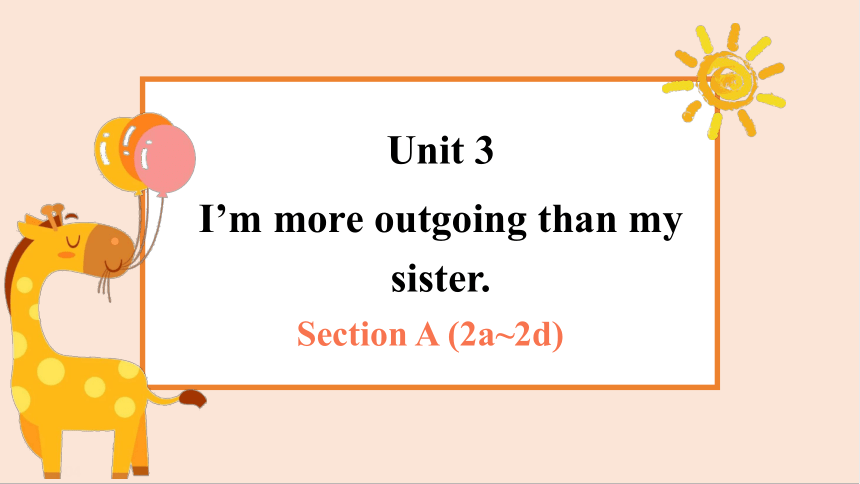 | |
| 格式 | pptx | ||
| 文件大小 | 4.6MB | ||
| 资源类型 | 教案 | ||
| 版本资源 | 人教新目标(Go for it)版 | ||
| 科目 | 英语 | ||
| 更新时间 | 2024-10-10 16:24:07 | ||
图片预览

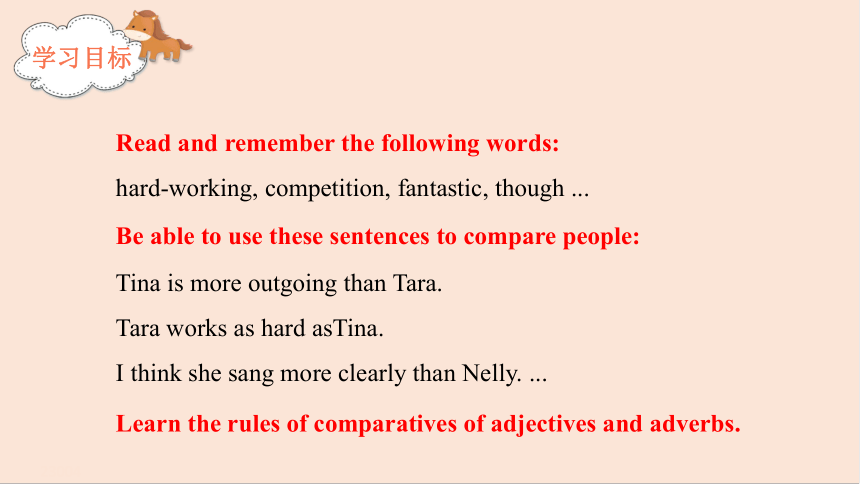
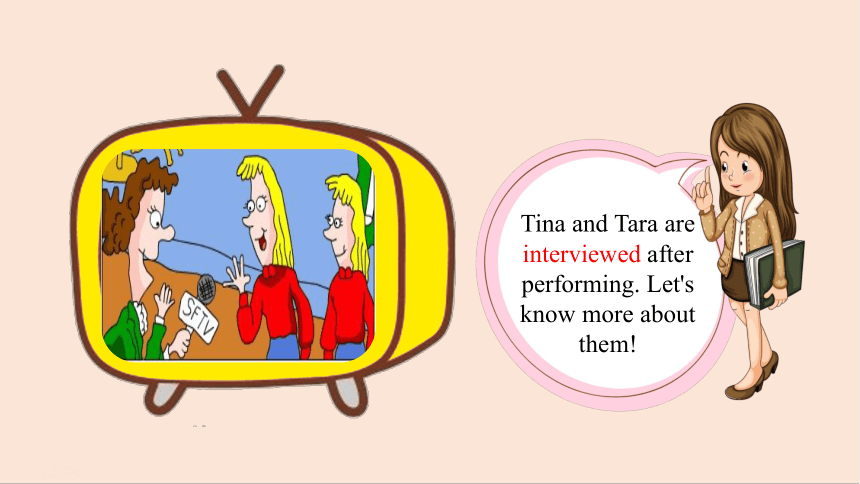
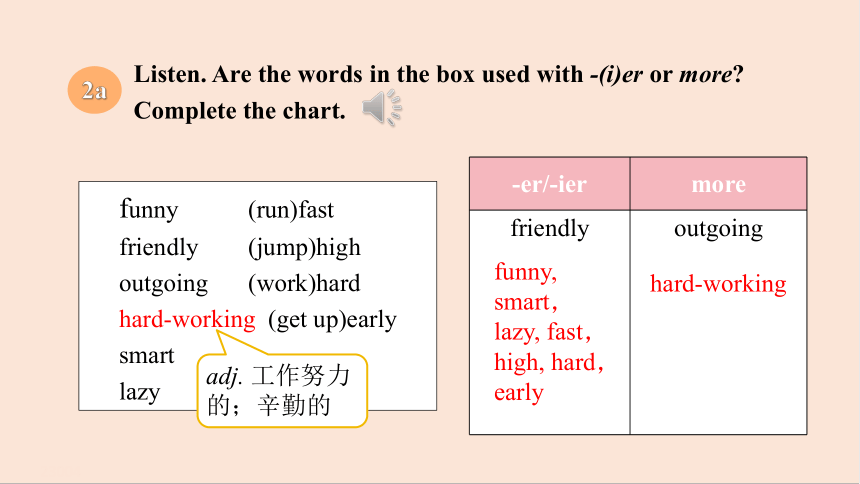
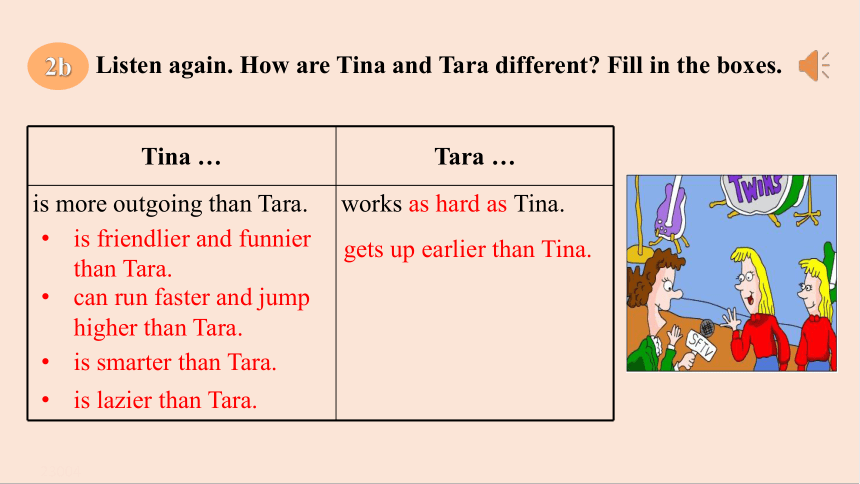
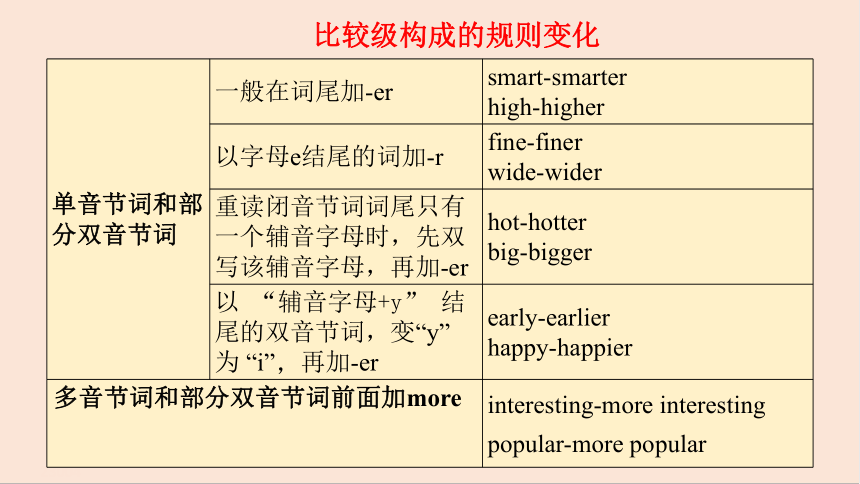
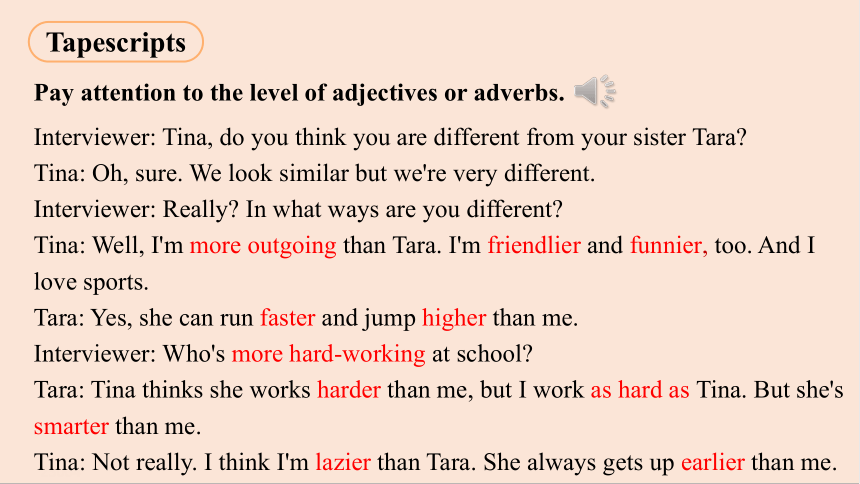
文档简介
(共18张PPT)
Section A (2a~2d)
Unit 3
I’m more outgoing than my sister.
Read and remember the following words:
hard-working, competition, fantastic, though ...
Be able to use these sentences to compare people:
Learn the rules of comparatives of adjectives and adverbs.
Tina is more outgoing than Tara.
Tara works as hard asTina.
I think she sang more clearly than Nelly. ...
学习目标
Tina and Tara are interviewed after performing. Let's know more about them!
funny (run)fast
friendly (jump)high
outgoing (work)hard
hard-working (get up)early
smart
lazy
Listen. Are the words in the box used with -(i)er or more Complete the chart.
-er/-ier more
friendly outgoing
adj. 工作努力的;辛勤的
funny, smart,
lazy, fast,
high, hard,
early
hard-working
2a
Tina … Tara …
is more outgoing than Tara. works as hard as Tina.
is friendlier and funnier than Tara.
can run faster and jump higher than Tara.
is lazier than Tara.
is smarter than Tara.
gets up earlier than Tina.
Listen again. How are Tina and Tara different Fill in the boxes.
2b
单音节词和部分双音节词 一般在词尾加-er smart-smarter
high-higher
以字母e结尾的词加-r fine-finer
wide-wider
重读闭音节词词尾只有一个辅音字母时,先双写该辅音字母,再加-er hot-hotter
big-bigger
以 “辅音字母+y” 结尾的双音节词,变“y” 为 “i”,再加-er early-earlier
happy-happier
多音节词和部分双音节词前面加more interesting-more interesting
popular-more popular
比较级构成的规则变化
Pay attention to the level of adjectives or adverbs.
Interviewer: Tina, do you think you are different from your sister Tara
Tina: Oh, sure. We look similar but we're very different.
Interviewer: Really In what ways are you different
Tina: Well, I'm more outgoing than Tara. I'm friendlier and funnier, too. And I love sports.
Tara: Yes, she can run faster and jump higher than me.
Interviewer: Who's more hard-working at school
Tara: Tina thinks she works harder than me, but I work as hard as Tina. But she's smarter than me.
Tina: Not really. I think I'm lazier than Tara. She always gets up earlier than me.
Tapescripts
Sam is taller than Tom.
Sam gets up as early as than Tom.
Sam is funnier than Tom.
Sam is more hardworking than Tom.
Sam is smarter than Tom.
Tom runs faster than Sam.
Tom is thinner than Sam.
Tom is friendlier than Sam.
Student A, look at the chart below. Student B, look at the chart on P81. Ask and answer questions about Sam and Tom.
2c
The older, the wiser.
姜是老的辣。
Two heads are better than one.
三个臭皮匠,顶个诸葛亮。
The more, the better.
越多越好。
Health is more important than wealth.
健康比财富更重要。
Actions speak louder than words.
事实胜于雄辨。
Sayings
1. What did Anna think of the singing competition yesterday
2. Which girl was Lisa
3. Who sang more clearly
4. What is the most important thing
Anna thought the singing competition was fantastic.
The one with shorter hair.
Lisa sang more clearly than Nelly.
To learn something new and have fun.
Listen to the conversation and answer the questions.
2d
Julie: Did you like the singing competition yesterday, Anna
Anna: Oh, it was fantastic! Nelly sang so well!
Julie: Well, I think Lisa sang better than Nelly.
Anna: Oh, which one was Lisa
Julie: The one with shorter hair. I think she sang more clearly than Nelly.
adj. 极好的;了不起的 同义词有great、wonderful
adj. 哪一个;哪一些
n. 比赛;竞赛;竞争
adv. 清楚地;清晰地;明白地
Read 2d together.
Anna: Yes, but Nelly danced better than Lisa.
Julie: You can tell that Lisa really wanted to win, though.
Anna: Well, everyone wants to win. But the most important
thing is to learn something new and have fun.
v. 获胜;赢;赢得
动词不定式作表语
玩得开心,相当于have a good time/enjoy oneself。
1. You can tell that Lisa really wanted to win, though. (教材P18 2d)
tell v. 知道;看出
(1) win在本句中作不及物动词,意为“获胜;赢”。
Who doesn't want to win
win也可作及物动词,意为“赢得”。其宾语通常为表示比赛项目、奖品或战争等的名词。
Our team won the football match.
Britain won five gold medals.
Language points
(2) though作副词,意为“不过;可是;然而”,常用于口语中,一般放在句尾。
—Have you ever been to Australia 你去过澳大利亚吗?
—No. I’d like to, though. 没有。不过我很想去。
It was a hard job. He took it, though.
这是份苦差事,可他还是接受了。
拓展: (1)though还可以作连词,意为“虽然;尽管”,
引导让步状语从句,此时可以和although互换。
e.g. Though/Although he was ill, he worked hard.
他虽然生病了,但仍努力工作。
(2)though/although不能和but连用,但可以和yet, still连用。
e.g. Though/Although he is 90, he is still very healthy.
尽管已经90岁了,但他仍然很健康。
1. Randy wrote two novels. of them were made into films. I've seen them.
A. None B. Both C. All D. Neither
2. You've done a good job, and I'm sure you can do it .
A. worse B. worst C.better D. best
一、单项选择
B
C
当堂检测
3. he knew the story well, he still needed to keep all the words in mind.
A. Unless B.Though C. Since D. Until
4. Professor Tu Youyou never stops doing research on Chinese medicine, _____
A. is she B. does she
C. isn't she D. doesn't she
B
B
1. Write down at least six sentences about similarities and differences between you and your best friend.
2. Preview the new words and phrases in Section A (Grammar Focus-3c).
Homework
Section A (2a~2d)
Unit 3
I’m more outgoing than my sister.
Read and remember the following words:
hard-working, competition, fantastic, though ...
Be able to use these sentences to compare people:
Learn the rules of comparatives of adjectives and adverbs.
Tina is more outgoing than Tara.
Tara works as hard asTina.
I think she sang more clearly than Nelly. ...
学习目标
Tina and Tara are interviewed after performing. Let's know more about them!
funny (run)fast
friendly (jump)high
outgoing (work)hard
hard-working (get up)early
smart
lazy
Listen. Are the words in the box used with -(i)er or more Complete the chart.
-er/-ier more
friendly outgoing
adj. 工作努力的;辛勤的
funny, smart,
lazy, fast,
high, hard,
early
hard-working
2a
Tina … Tara …
is more outgoing than Tara. works as hard as Tina.
is friendlier and funnier than Tara.
can run faster and jump higher than Tara.
is lazier than Tara.
is smarter than Tara.
gets up earlier than Tina.
Listen again. How are Tina and Tara different Fill in the boxes.
2b
单音节词和部分双音节词 一般在词尾加-er smart-smarter
high-higher
以字母e结尾的词加-r fine-finer
wide-wider
重读闭音节词词尾只有一个辅音字母时,先双写该辅音字母,再加-er hot-hotter
big-bigger
以 “辅音字母+y” 结尾的双音节词,变“y” 为 “i”,再加-er early-earlier
happy-happier
多音节词和部分双音节词前面加more interesting-more interesting
popular-more popular
比较级构成的规则变化
Pay attention to the level of adjectives or adverbs.
Interviewer: Tina, do you think you are different from your sister Tara
Tina: Oh, sure. We look similar but we're very different.
Interviewer: Really In what ways are you different
Tina: Well, I'm more outgoing than Tara. I'm friendlier and funnier, too. And I love sports.
Tara: Yes, she can run faster and jump higher than me.
Interviewer: Who's more hard-working at school
Tara: Tina thinks she works harder than me, but I work as hard as Tina. But she's smarter than me.
Tina: Not really. I think I'm lazier than Tara. She always gets up earlier than me.
Tapescripts
Sam is taller than Tom.
Sam gets up as early as than Tom.
Sam is funnier than Tom.
Sam is more hardworking than Tom.
Sam is smarter than Tom.
Tom runs faster than Sam.
Tom is thinner than Sam.
Tom is friendlier than Sam.
Student A, look at the chart below. Student B, look at the chart on P81. Ask and answer questions about Sam and Tom.
2c
The older, the wiser.
姜是老的辣。
Two heads are better than one.
三个臭皮匠,顶个诸葛亮。
The more, the better.
越多越好。
Health is more important than wealth.
健康比财富更重要。
Actions speak louder than words.
事实胜于雄辨。
Sayings
1. What did Anna think of the singing competition yesterday
2. Which girl was Lisa
3. Who sang more clearly
4. What is the most important thing
Anna thought the singing competition was fantastic.
The one with shorter hair.
Lisa sang more clearly than Nelly.
To learn something new and have fun.
Listen to the conversation and answer the questions.
2d
Julie: Did you like the singing competition yesterday, Anna
Anna: Oh, it was fantastic! Nelly sang so well!
Julie: Well, I think Lisa sang better than Nelly.
Anna: Oh, which one was Lisa
Julie: The one with shorter hair. I think she sang more clearly than Nelly.
adj. 极好的;了不起的 同义词有great、wonderful
adj. 哪一个;哪一些
n. 比赛;竞赛;竞争
adv. 清楚地;清晰地;明白地
Read 2d together.
Anna: Yes, but Nelly danced better than Lisa.
Julie: You can tell that Lisa really wanted to win, though.
Anna: Well, everyone wants to win. But the most important
thing is to learn something new and have fun.
v. 获胜;赢;赢得
动词不定式作表语
玩得开心,相当于have a good time/enjoy oneself。
1. You can tell that Lisa really wanted to win, though. (教材P18 2d)
tell v. 知道;看出
(1) win在本句中作不及物动词,意为“获胜;赢”。
Who doesn't want to win
win也可作及物动词,意为“赢得”。其宾语通常为表示比赛项目、奖品或战争等的名词。
Our team won the football match.
Britain won five gold medals.
Language points
(2) though作副词,意为“不过;可是;然而”,常用于口语中,一般放在句尾。
—Have you ever been to Australia 你去过澳大利亚吗?
—No. I’d like to, though. 没有。不过我很想去。
It was a hard job. He took it, though.
这是份苦差事,可他还是接受了。
拓展: (1)though还可以作连词,意为“虽然;尽管”,
引导让步状语从句,此时可以和although互换。
e.g. Though/Although he was ill, he worked hard.
他虽然生病了,但仍努力工作。
(2)though/although不能和but连用,但可以和yet, still连用。
e.g. Though/Although he is 90, he is still very healthy.
尽管已经90岁了,但他仍然很健康。
1. Randy wrote two novels. of them were made into films. I've seen them.
A. None B. Both C. All D. Neither
2. You've done a good job, and I'm sure you can do it .
A. worse B. worst C.better D. best
一、单项选择
B
C
当堂检测
3. he knew the story well, he still needed to keep all the words in mind.
A. Unless B.Though C. Since D. Until
4. Professor Tu Youyou never stops doing research on Chinese medicine, _____
A. is she B. does she
C. isn't she D. doesn't she
B
B
1. Write down at least six sentences about similarities and differences between you and your best friend.
2. Preview the new words and phrases in Section A (Grammar Focus-3c).
Homework
同课章节目录
- Unit 1 Where did you go on vacation?
- Section A
- Section B
- Unit 2 How often do you exercise?
- Section A
- Section B
- Unit 3 I'm more outgoing than my sister.
- Section A
- Section B
- Unit 4 What's the best movie theater?
- Section A
- Section B
- Unit 5 Do you want to watch a game show?
- Section A
- Section B
- Unit 6 I'm going to study computer science.
- Section A
- Section B
- Unit 7 Will people have robots?
- Section A
- Section B
- Unit 8 How do you make a banana milk shake?
- Section A
- Section B
- Unit 9 Can you come to my party?
- Section A
- Section B
- Unit 10 If you go to the party, you'll have a grea
- Section A
- Section B
